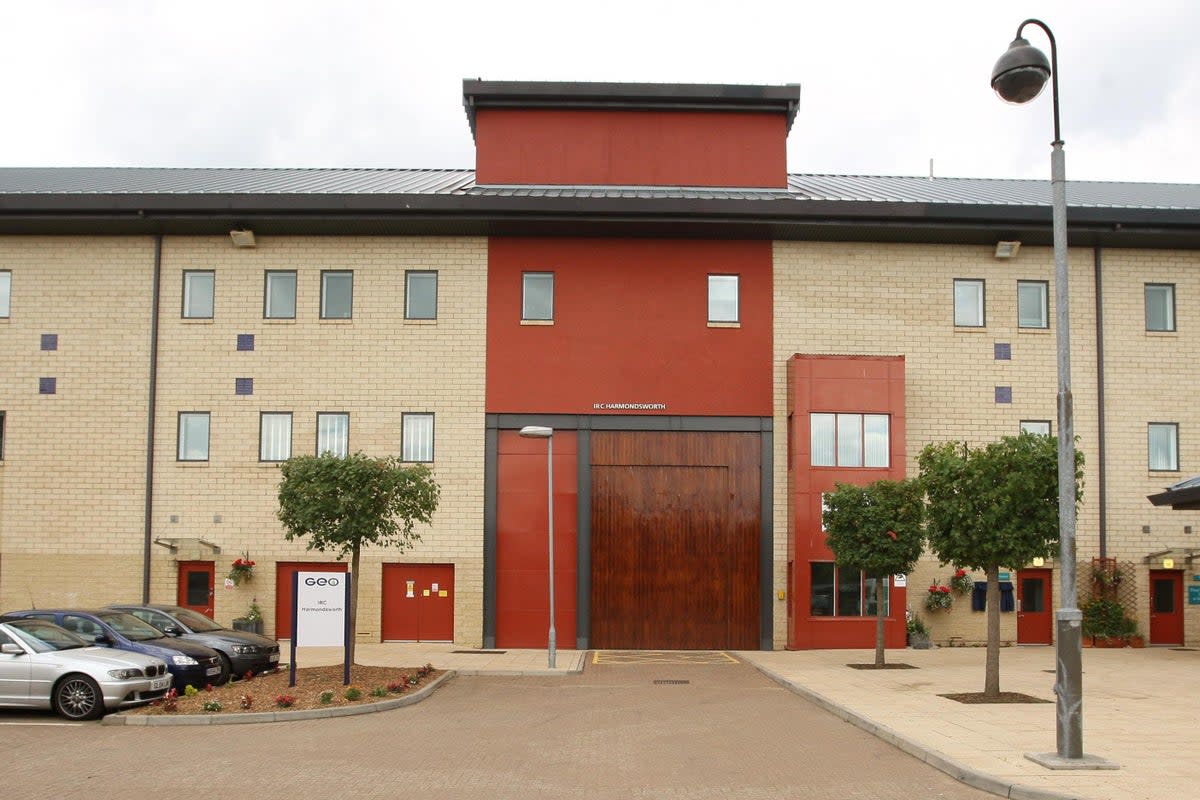Immigration centre near Heathrow worst in country, inspection finds

Conditions at an immigration detention centre in west London have been branded the “worst” in the country by a watchdog who described the “chaos” he discovered there “truly shocking”.
Chief inspector of prisons Charlie Taylor said he was so concerned by what he found at Harmondsworth immigration removal centre (IRC), near Heathrow Airport, that he raised his concerns with the then-home secretary James Cleverly, who never replied.
There had been several serious suicide attempts at the “decrepit” building which can hold close to 700 men, according to findings published on Tuesday.
Violence and drug use was also rife at the site, having “substantially increased” since inspectors last visited.
The number of assaults had doubled since the last inspection and drug-taking, which is typically rare in immigration removal centres, was “widespread”.
Inspectors “could smell cannabis and saw detainees openly smoking in communal areas without being challenged by staff who largely kept to offices with ‘do not enter’ taped across their doors”, the watchdog warned.
“The level of chaos that we found at Harmondsworth was truly shocking and we left deeply concerned that some of those held there were at imminent risk of harm,” said Mr Taylor.
“Nobody should be detained in an immigration removal centre unless they are going to be removed quickly from the country, yet around 60 per cent of detainees were released from the centre, with only a third deported, which begs the question of why so much taxpayer money was being spent keeping them locked up in the first place.”
Mr Taylor wrote to former home secretary Mr Cleverly on March 12 after the inspection between February 12 and 29 “setting out the many failures at the centre” but has “received no response”, according to the watchdog.
While the IRC’s new director had a “good understanding” of many of the challenges faced by the centre and was “beginning to make good progress” in improving conditions, she will “need strong and consistent support at every level to succeed”, Mr Taylor added.
The watchdog told how cells had been doubled up to hold more men but if detainees refused to share, they were held in a separation unit until they agreed.
Mitie Care and Custody, which runs the centre, faced numerous challenges including staff shortages and a “shambolic retendering process” led by the Home Office meant that leaders had “no idea whether they would still be running the centre in the next few months”, according to the findings.
The contractual uncertainties had been a problem since last year which made it “all but impossible to recruit permanent senior staff, who might only be in post for a matter of weeks”, the watchdog said.
Kolbassia Haoussou, a refugee who fled torture in Africa and now works for charity Freedom from Torture, said he was held in Harmondsworth when he first arrived in the UK in 2005 and knows “only too well how profoundly damaging detention can be”.
He called on the new Government to “rebuild a just asylum system that respects human dignity and the rule of law”.
In a statement, Mitie said it acknowledged the conditions and standard of care “fell below the level we would expect at this facility” when the inspection took place.
“We take on board all of the recommendations that they have made and will work tirelessly to implement them as soon as reasonably practicable.”
The statement said conditions at the time had been affected by factors including “an interim increase in room occupancy rates, due to restricted capacity at the IRC, with one wing (out of four) being closed for refurbishment”.
The statement added: “This work is scheduled to be completed in August, following which a second wing (the conditions of which were particularly criticised by the inspection) will itself be closed for refurbishment.”
Mitie said the demographic of the population at the IRC had “changed significantly” in the last 24 months, suggesting this had led to a rise in violence.
It said Time Served Foreign National Offenders (TSFNOs) now represented between 50 and 60 per cent of the site’s total population, with more than half (53 per cent) of all residents now arriving from police custody or prisons, up from 31 per cent in 2022.
“The change in demographics has led to a material increase in disruptive behaviours and incidents,” said Mitie
“Between June and November 2023, there were 97 fights and incidents of violence, up from 26 incidents during same period the previous year, all of which involved TSFNOs.
“In response to this change in demographics, we agreed a new staffing model with the Home Office (with improved pay and contracted hours for all Detention & Custody Officers (DCOs)), which has led to an 40 per cent increase in the number of DCOs deployed at the IRC, with further DCOs still being recruited.”
This had led to “a material improvement” in staff engagement and retention, the statement said.
Mitie said it was enforcing a smoking ban introduced by the Home Office last month across all IRCs.
The Home Office said: “We take the welfare and safety of people in our care very seriously and it is vital that detention and removals are carried out with dignity and respect.
“The number of custody officers and dedicated welfare staff at Harmondsworth IRC has been increased since the inspection.”


